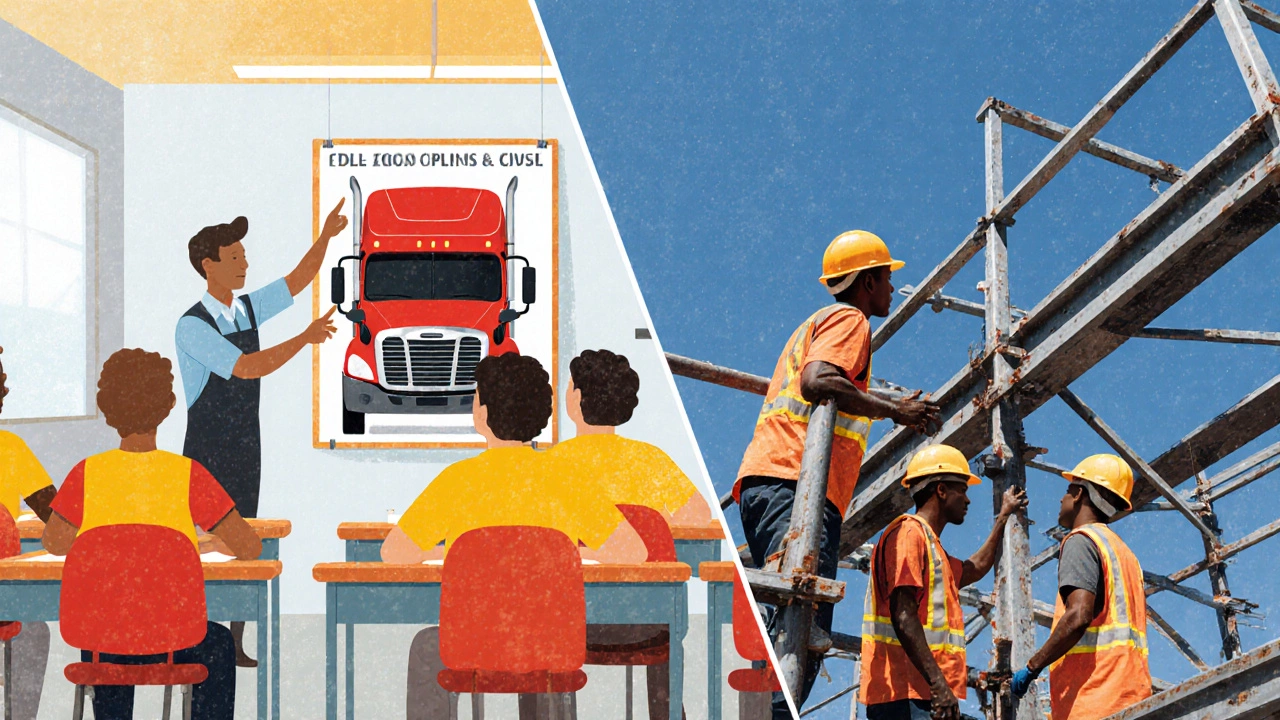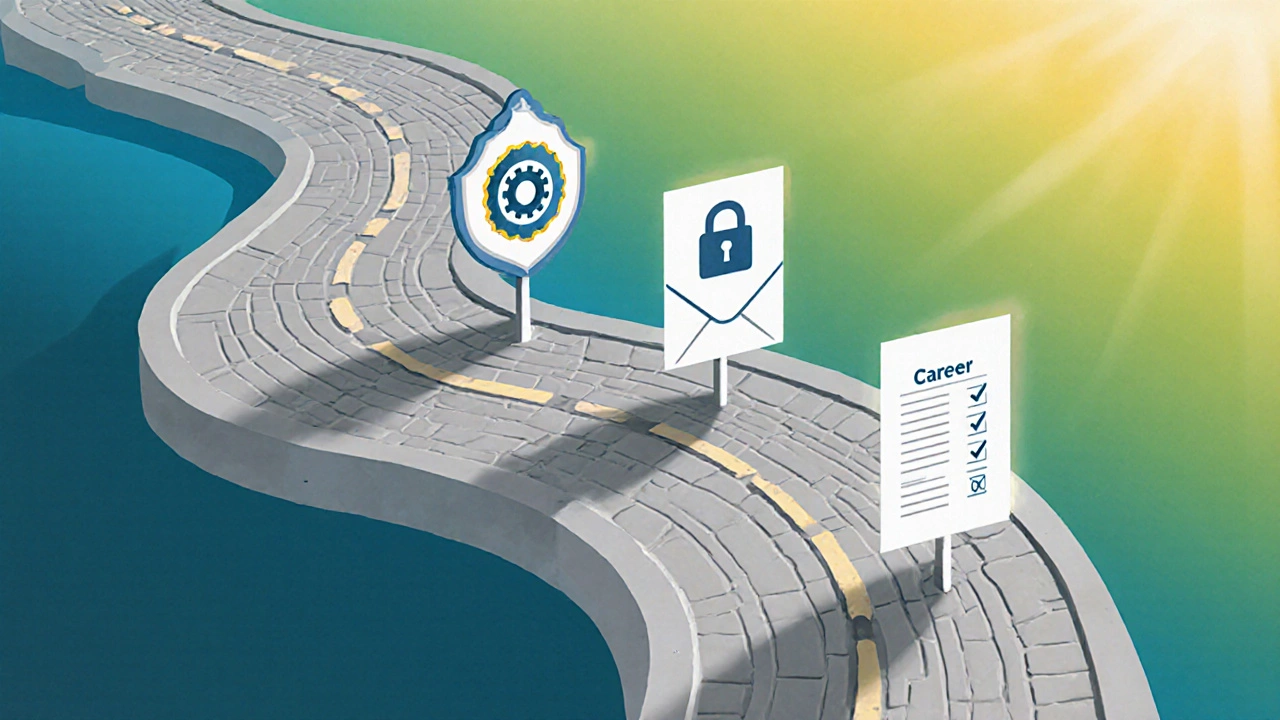Felon-Friendly Job Finder
Discover the best job opportunities for your situation. This tool matches your background with felon-friendly careers based on your conviction type, time elapsed, and skills.
Find Your Best Job Match
Answer a few questions to see which jobs are most suitable for your situation.
Your Best Matches
Finding a steady paycheck after a conviction can feel like searching for a needle in a haystack. The good news? Plenty of employers-both private and public-are willing to give a second chance, especially when you bring the right training and a clean attitude.
Jobs for felons are positions that either legally allow a criminal record or have a track record of hiring people with past convictions. These roles often focus on skills you can pick up quickly, offer on‑the‑job training, and sometimes come with a clear pathway to advancement.
How the hiring landscape works for felons
Most employers run a background check, but the depth of that check varies. Federal agencies follow the Office of Personnel Management guidelines, which bar certain crimes from security‑sensitive jobs. State and local governments have their own policies; for example, many states prohibit felons from becoming police officers but allow them in roles like US Postal Service clerk or driver.
Key factors that influence eligibility:
- Nature of the conviction - violent or sexual offenses are the toughest to overcome.
- Time elapsed - the older the record, the more likely an employer will overlook it.
- Rehabilitation steps - completed programs, certifications, or expungements signal responsibility.
- Industry demand - sectors with labor shortages (truck driving, logistics, construction) are more flexible.
Top felon‑friendly career paths
Below are eight career tracks that consistently hire people with criminal histories. Each includes typical entry requirements, average salary, and why employers are keen to fill the slot.
1. Truck Driving
Truck Driving remains one of the most accessible jobs. Most companies only need a clean driving record and a Commercial Driver’s License (CDL). Many community colleges and private schools offer fast‑track CDL programs (4‑6 weeks) that accept felons, especially for non‑hazmat endorsements.
- Average salary: $55,000 - $70,000 per year
- Training cost: $2,500 - $5,000 (often reimbursable through workforce grants)
- Felon‑friendly rating: High - almost all major carriers (e.g., Schneider, Swift) hire qualified CDL holders regardless of record.
2. Construction & Skilled Trades
The construction boom across the U.S. means a steady demand for laborers, electricians, plumbers, and welders. Unions and private contractors often partner with state Vocational Rehabilitation programs that specifically target ex‑offenders.
- Average salary: $45,000 - $60,000 for skilled positions
- Apprenticeship length: 12‑24 months (paid on‑the‑job)
- Felon‑friendly rating: Medium‑High - many unions waive background restrictions if the trade certification is earned.
3. Food Service & Hospitality
Restaurants, hotels, and catering firms are notorious for high turnover, so they often give a chance to those with a record. Starting as a line cook, server, or dishwasher can lead to supervisory roles within a couple of years.
- Average hourly wage: $12 - $18
- Advancement: Management positions can exceed $50,000 annually
- Felon‑friendly rating: Very High - most chains (e.g., Subway, Chipotle) have no blanket bans.
4. Warehouse & Logistics
Amazon, FedEx, and regional distribution centers constantly hire for pick‑pack, forklift, and inventory control roles. Many facilities run internal background checks that focus on recent offenses only.
- Average hourly wage: $15 - $22
- Certification: Forklift Operator (often paid for on‑site)
- Felon‑friendly rating: High - especially for non‑supervisory roles.
5. IT Help Desk & Support
Tech support roles are in demand, and certifications like CompTIA A+ or Google IT Support can outweigh a criminal record. Many community colleges provide accelerated pathways that accept felons.
- Average salary: $45,000 - $60,000
- Training: 3‑6 months (online or in‑person)
- Felon‑friendly rating: Medium - security‑sensitive positions may be blocked, but entry‑level desks are open.
6. US Postal Service (USPS)
The USPS is a federal employer that historically offers a clear path for individuals with records, provided the offense isn’t related to fraud or theft of mail. Positions include mail carrier, sorter, and clerical staff.
- Average salary: $45,000 - $65,000
- Benefits: Health, retirement, and paid leave
- Felon‑friendly rating: High - the agency runs a “risk‑based” review rather than a blanket ban.
7. Manufacturing & Assembly
Factories across the Midwest and South look for welders, machinists, and assembly line workers. Union shops often have apprenticeship programs that welcome felons who have completed a safety certification.
- Average salary: $40,000 - $55,000
- Shift options: Day, swing, or night (flexible for childcare)
- Felon‑friendly rating: Medium - background checks focus on violence, not minor drug offenses.
8. Government‑Contractor Roles (e.g., security guard, maintenance)
State and local contracts for building maintenance or security often hire through staffing agencies that specialize in “second‑chance” workers. Some roles require a state security clearance, but many don’t.
- Average hourly wage: $14 - $20
- Training: On‑the‑job, sometimes a short state‑mandated course
- Felon‑friendly rating: Variable - depends on the contract’s security requirements.
Government hiring nuances for felons
Federal jobs are governed by the OPM’s suitability guidelines. While a conviction doesn’t automatically disqualify you, certain positions (especially those involving national security, law enforcement, or fiduciary responsibility) have strict prohibitions.
State agencies, however, often have more leeway. For example, many states allow felons to work as correctional officer after a waiting period and a clean conduct record.
Key steps to navigate government hiring:
- Check the specific agency’s employment eligibility policy before applying.
- Obtain a copy of your criminal record and be ready to explain the circumstances.
- Secure any needed certifications (e.g., CDL for driver positions, forklift license for warehouse jobs).
- Consider applying through a staffing agency that has existing contracts with government entities - they often handle the background‑check paperwork.

Boosting your employability
Even the most felon‑friendly jobs have minimum expectations. Here’s a checklist to improve your odds:
- Earn a recognized certification - CDL, OSHA 10‑hour safety, CompTIA A+, or HVAC.
- Complete a re‑entry program - many state departments of corrections run job‑readiness workshops.
- Apply for expungement or record sealing if eligible; a cleaner record widens your options.
- Build a solid resume focusing on skills, training, and any volunteer work.
- Network through mentors - former inmates who have successfully transitioned can provide introductions.
Training resources and assistance programs
Several nationwide and state‑level resources target felons seeking work:
- America Works - places participants in entry‑level jobs and provides on‑the‑job training.
- Second Chance Act Grants - fund local nonprofits that run vocational programs.
- Department of Labor’s Workforce Innovation and Opportunity Act (WIOA) - offers tuition assistance for approved certification courses.
- State Re‑Entry Councils - often partner with community colleges to waive tuition for felons.

Comparison of top felon‑friendly jobs
| Job | Typical Salary | Training Length | Key Certification | Felon‑Friendly Rating |
|---|---|---|---|---|
| Truck Driving | $55k‑$70k | 4‑6 weeks | CDL (Class A/B) | High |
| Construction (Skilled Trade) | $45k‑$60k | 12‑24 months (apprenticeship) | Trade License (Electrician, Plumber) | Medium‑High |
| Food Service | $12‑$18 / hr | On‑the‑job | ServSafe (optional) | Very High |
| Warehouse/Logistics | $15‑$22 / hr | 2‑4 weeks | Forklift Operator | High |
| IT Help Desk | $45k‑$60k | 3‑6 months | CompTIA A+ | Medium |
| US Postal Service | $45k‑$65k | 2‑4 weeks | Mail Carrier Training | High |
Next‑step checklist
Use this quick cheat‑sheet after you finish reading:
- Pick a target job from the table above.
- Enroll in the recommended certification (many community colleges offer free or low‑cost options for felons).
- Complete any state‑mandated re‑entry program or obtain an expungement if possible.
- Craft a resume that highlights training, certifications, and any volunteer work.
- Apply through a staffing agency that specializes in second‑chance placements, or go directly to employer career pages.
- Prepare for the interview: be ready to discuss your conviction briefly, focus on what you learned, and show forward‑looking goals.
Can felons work for the federal government?
Yes, but it depends on the agency and the nature of the offense. Positions that involve law enforcement, national security, or handling sensitive financial data often have strict bans. Roles like postal carrier, truck driver, or non‑security support are usually open if you meet the certification requirements.
Do I need a clean driving record to become a truck driver?
A CDL is required, and most companies want a clean record for the past 3‑5 years. Minor traffic violations usually don’t disqualify you, but DUIs or reckless driving can be a deal‑breaker.
How can I get my criminal record sealed?
Eligibility varies by state. Generally, you must have completed all sentences, probation, and have no new offenses for a set period (often 5 years). File a petition with the court and provide supporting documents; many legal aid organizations offer free assistance.
Are there scholarships for felons pursuing certifications?
Yes. Programs like the Second Chance Scholarship and state‑run Workforce Development grants specifically cover vocational training for people with criminal histories. Check your local community college’s financial aid office for details.
What’s the fastest way to earn a good salary after release?
Truck driving is often the quickest route: a 4‑6 week CDL course leads to jobs paying $55k‑$70k with minimal prior experience. Pair it with a clean driving record and you’re set for steady work.
